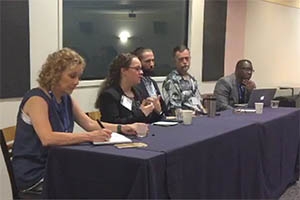On Campus
Public Management Scholars Discuss Diversity Research at PMRC

Left to right: Leisha DeHart-Davis, Alisa Hicklin Fryar, Nathan Favero, Gregory Lewis, and Brian Williams
A panel of experts at the Public Management Research Conference - hosted by American University School of Public Affairs – discussed the need to rethink research methods, gain access to data, and make the findings on racial and gender disparities in the federal workforce more widely available to the public.
Brian Williams of University of Georgia encouraged his colleagues to go beyond scholarship of public management diversity research to translate their work into action.
“There is ample evidence that shows we are not affecting change,” said Williams. “The practical question is how do we engage in efforts that move from our minds to our hearts and ultimately to hands and feet?”
There are internal and external obstacles to producing practical research and getting results to policymakers. Papers that count toward academic output and considered “important” but aren’t as valued as “significant” work that is centered on outcomes of helping others, maintains Williams.
"To improve diverse representation in government, scholars need to communicate science in understandable language that has implications,” said Williams. “There is an opportunity to go beyond this siloed research and to start to build bridges.”
At the roundtable, Nathan Favero of American University School of Public Affairs raised concern about the broad groupings of race and ethnicity used in diversity research.
“We should do more to disentangle these categories,” said Favero. “Within groups, there can be differences in values, upbringing, and socialization. Also artificially grouping African-Americans, Latinos and Asians into one minority category can overlook the differences in each subgroup.”
Gregory Lewis of Georgia State University addressed the need to push for better quality data and access to federal personnel records. In conducting research on diversity, Lewis noted the importance of recognizing reasons for under-representation of Latinos (many ineligible because of citizen status and younger age) and the impact of veteran preference in hiring on the federal workforce.
“The number of journals and scholars interested in questions relating to diversity is very encouraging. However, the discussion is still very narrow – there aren’t many conversations outside of race, gender, and ethnicity,” said Alisa Hicklin Fryar, Assistant Professor of Political Science at the University of Oklahoma.
During the question-and-answer portion of the session, some participants raised the need to think about diversity in terms of age and economic class. Others requested training material for mid-career bureaucrats on implicit bias and diversity.
“We’ve got this huge gap in diversity management and there is not good, research-based material to help leaders figure out what to do,” said Catherine Gerard, director of the Program on the Advancement of Research on Conflict and Cooperation at Syracuse University. “The field needs to think more holistically about connecting the pieces based on the experience of the people we are theoretically writing for - not just researchers, but public managers.”
K. Juree Capers, and assistant professor in public management and policy at Georgia State University, said researchers have a responsibility to make their work open.
“As a professor at a public institution, our work is a public good and I need to work to share it with the public,” said Capers. “If it’s not accessible to the public, I’m not doing my job.”
Diversity should not be a separate part of the curriculum for graduate schools, according to Morgen Johansen, associate professor in public administration at the University of Hawaii. She told the panelists that she includes material on social justice and social equity in every topic so her students embrace the idea of being inclusive public servants.
At the conclusion, Moderator Leisha DeHart-Davis of University of North Carolina said that there was a recognition that the field public administration can change how it does its business.
“There needs to be openness to different types of research,” said DeHart-Davis. “Our field can be relevant and rigorous and engaged in real world problems. There is no reason we cannot pull that off, but it takes intentionality. I think we heard receptiveness to going in that direction. The stars are aligning in public administration that will lead to a very different field five to 20 years down the road.”

